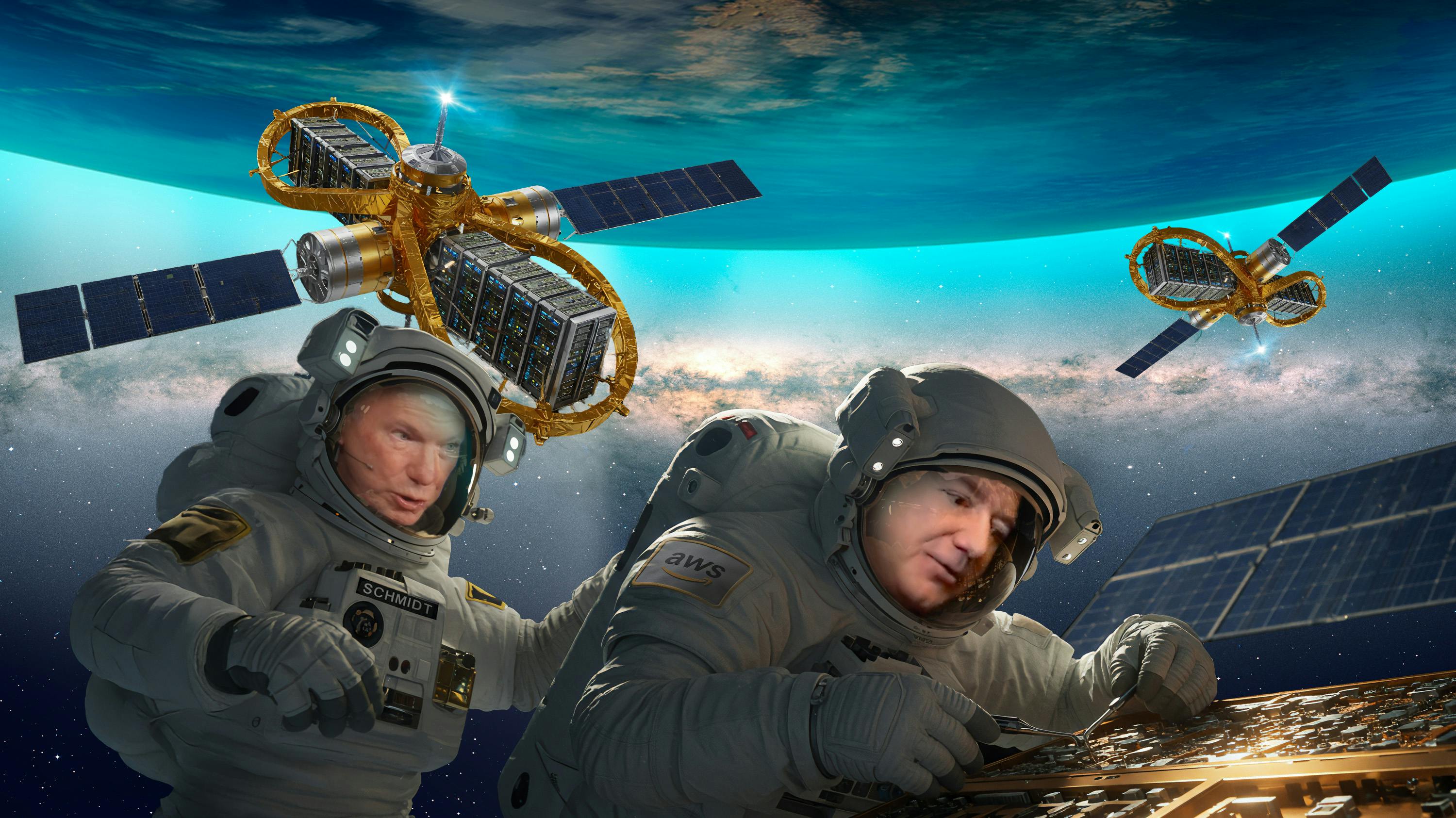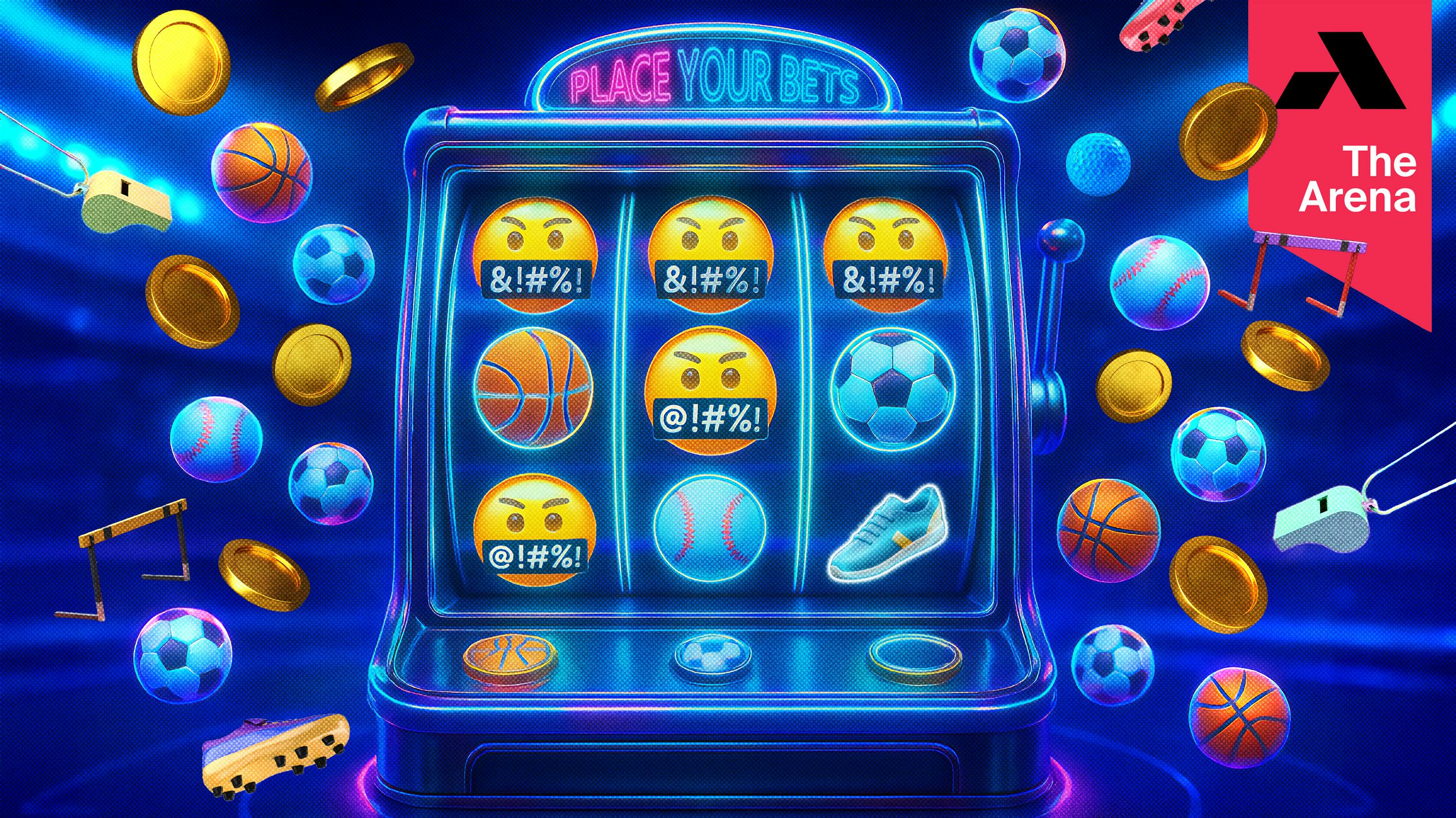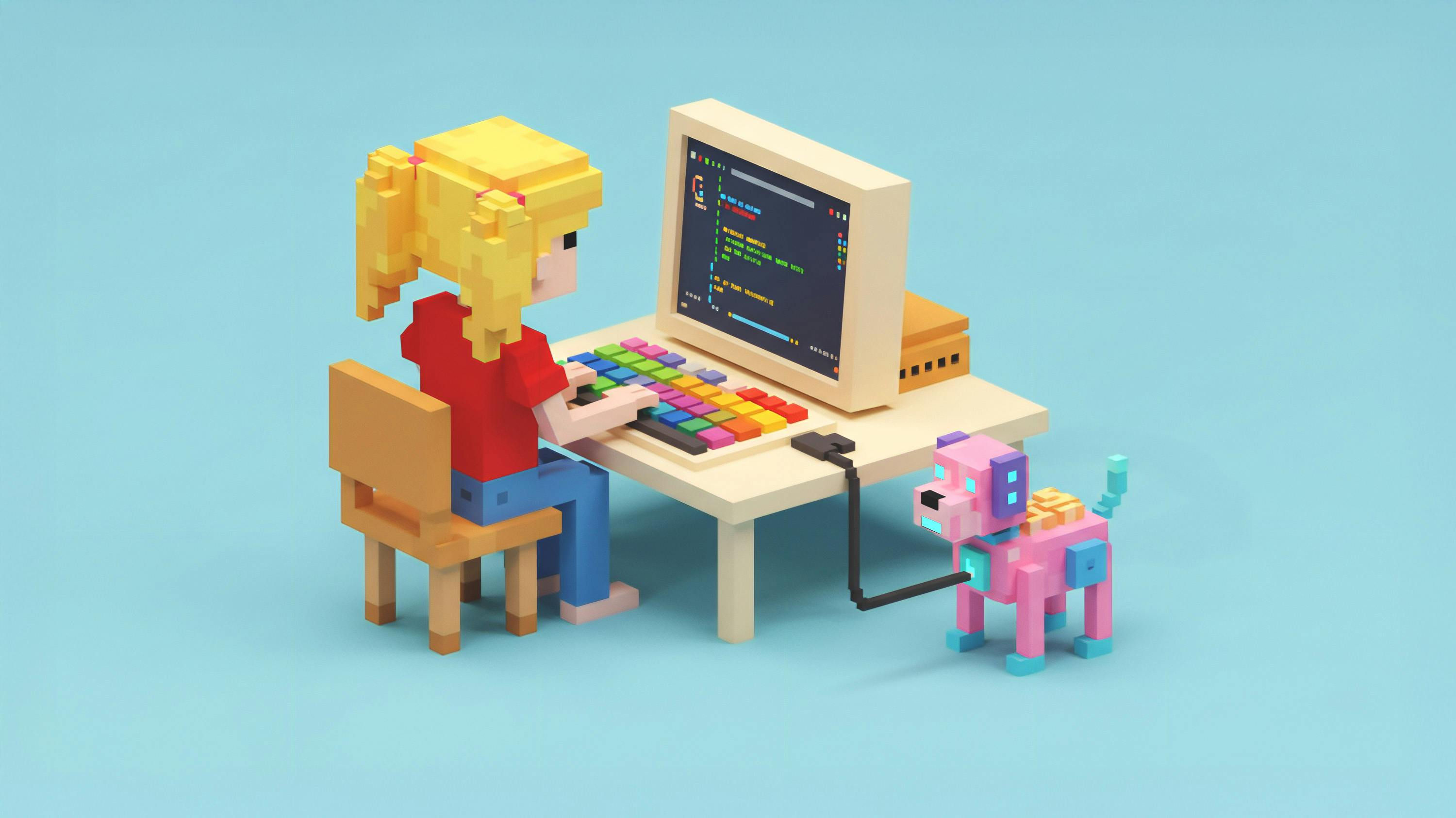| Welcome, Weekenders! In this newsletter: |
| • The Big Read: Why Eric Schmidt and Jeff Bezos are sky-high on space data centers |
| • The Arena: Online gambling’s toxic content problem |
| • Opinion: AI has only made coding skills even more essential, Hadi Partovi argues |
| • Plus, our Recommendations: Massachusett’s major wager; Aristotle’s pastime; and a pair of twisty sisters |
| |
| Billionaire divorces can get nasty. Just ask Stevie Cohen or Ken Griffin. |
| And certainly Elon Musk and Donald Trump have had their own share of acrimonious breakups in their personal lives over the years—but nothing really compares to their acrid professional split, which seeped into very public view on Thursday. You noticed, right? |
| As the dust settles, I see a couple of likely winners emerging on the horizon. An obvious one is Jeff Bezos. If Trump follows through on his threat to cut the contracts for Musk’s SpaceX, Bezos’ rival operation, Blue Origin, really has the only other rockets in town. Another feasible winner is Sam Altman. Trump knows full well that Altman and Musk consider each other something close to mortal enemies. That hasn’t stopped Trump from supporting Altman and his OpenAI. I’m sure Trump knows an even tighter embrace of Altman would drive Musk nuts. |
| I don’t think the end of the Musk-Trump partnership is as good for tech Democrats and the left generally as some in their party might think. It could give them some extra oomph for the midterm elections—with Musk either sitting them out or causing primary chaos in the GOP. But Democrats are probably deluding themselves if they think Musk is going to end up on their sidelines or give up on politics. |
| As I considered those unlikely outcomes, I thought back to last summer, when I spent time with one of Musk’s closest friends, venture capitalist Joe Lonsdale. Granted, he and Musk aren’t carbon copies, but I think Lonsdale offers a pretty fair gauge of where Musk stands on many issues. Judging by what I know about Lonsdale, I think they’re both far more likely to shift their resources to anti-Trump Republicans than substantially throw their lots in with the Democrats. (Lonsdale has never been much of a Trumpist. He seemed to prefer a 2024 contest that featured Florida Gov. Ron DeSantis, for instance.) |
| For what it’s worth, I’ve identified one very clear batch of losers: the would-be Twitter competitors out there—Bluesky, Threads, yada, yada, yada. Absolutely no one headed to any of those outlets on Thursday to gawk and squawk as Trump and Musk melted down. It’d be nice to finally stop pretending they’re worth paying attention to. |
| An Impending Superbaby Boom? |
| In the last couple years, nearly $2 billion have flowed into fertility tech, leading to a slew of advancements in genetic tests for embryos that allow parents to screen potential offspring for height, eye color and other attributes. Now, Nucleus Genomics—a New York–based genetics startup backed by Founders Fund, Alexis Ohanian and a slew of other investors—says it has developed a test that will let parents rank embryos based on their potential lifespans by examining 900 different variables. The test costs $5,999 a pop, which ensures it’s something only the wealthy can afford. |
| Troubled by this “Gattaca”-esque reality? Hate to say it, but I suspect it’s only the beginning. As I said, investors are throwing billions of dollars into this industry, and startups like Nucleus will need to make those dollars worthwhile. Yet they will inevitably find their ambitions constrained by the small size of the possible market for $5,999 tests. So they’re going to have to come up with even more-sophisticated technology for which they can charge wealthy parents. Or they’ll go mass-market with what they’ve already developed. If they’re smart, they’ll do both. |
| Amazon’s Messenger Bots |
| Our Rocket Drew’s scoop this week that Amazon is beginning to test humanoid delivery robots is, yes, a little unsettling! Still, it’s hard to imagine they’ll be worse at the job than the flesh-and-blood team Amazon currently employs. |
| The HBO Head Fake |
| The New York Times described “Mountainhead,” the new AI apocalypse movie by “Succession” creator Jesse Armstrong, as a feat of “satirical daring,” while the Financial Times praised its ability to deliver a “real sting” to the tech industry. The Washington Post loved it, lauding Armstrong’s dialogue, which “eviscerate[s] the pretensions and delusions of America’s techno-elite.” |
| I wonder if the authors of those reviews watched an entirely different film than the one HBO released a week ago. “Mountainhead” is dreadful. HBO talked up how Armstrong completed it in a matter of months. Well, it shows! He clearly needed more time—time to examine the rhythms of Silicon Valley life beyond studying “All-In,” which he apparently viewed as a genuine source of insight. (Fingers crossed that former “Saturday Night Live” scribe Simon Rich does a better job in his adaptation of the OpenAI boardroom coup, a film project announced just a couple days ago, with Luca Guadagnino planning to direct.) |
| If “Mountainhead” achieves any lasting legacy, it might be to further reinforce Silicon Valley’s belief that the average member of the mainstream media holds a steadfast bias against technology and a simplistic dislike for the people within the industry. And that’s a justifiable conclusion, since it’s hard to see any other reason someone might heap any praise on the movie. |
| |
|
|
 |
|
| An unexpected thing happened a couple months ago: Eric Schmidt, the Google billionaire, bought a controlling interest in a little-known space outfit. What could explain his interest? |
| Data centers—in outer space. |
| The concept may seem far-fetched, but Schmidt, Jeff Bezos and a growing number of startups think they can make it happen, our Evan Robinson-Johnson reports in this week’s Big Read. In one way, data centers in space make a ton of sense: Data centers require enormous amounts of energy, and up above Earth, they can draw that power directly from the sun. On the other hand, data centers in space make no sense at all given the current economics of commercial space operations, which would make it very costly to get them going. |
| Jason Aspiotis, an executive at Axiom Space, which hopes to create some of these data centers, isn’t expecting anything to happen overnight. “It’s a decadal business play,” he said. |
|
 |
|
| As online betting has boomed, the digital attacks many fans launch against athletes have also intensified, as bettors blame the sports stars for their losses. It’s especially a problem for athletes like sprinter Gabby Thomas, who experienced one of these episodes earlier this week: Thomas doesn’t have the backing of an enormous sports league for protection, and as a result, she and other other athletes are stuck figuring out how to deal with angry fans themselves, our Sara Germano writes in the latest edition of The Arena, Weekend’s new franchise on the business of sports. |
|
 |
|
| Artificial intelligence is changing the world—and simplifying significant portions of it that once seemed impossibly complex, like coding. That doesn’t mean it’s less useful to learn coding. Just the opposite, actually: With coding becoming more of an everyday task, it’s never been more important to understand the skill, argues investor Hadi Partovi. |
| Abram Brown, editor of The Information’s Weekend section, thinks a quiet ghosting would’ve been better for the entire country. Reach him at abe@theinformation.com. |
| |
 |
| Listening: “Scratch and Win” (GBH) |
| Half my family hails from Massachusetts, and each Christmas, my parents would wend us from upstate New York over to ye ole homestead in Shrewsbury. There, presents galore awaited—and stockings stuffed partly with scratch-off lottery tickets. Everyone loved those silly games and hotly expected them in the stockings, which always sorta surprised me: Back home, scratch-off tickets were much less of a thing. |
| “Scratch and Win,” a podcast from Boston’s excellent public radio station, shed some light for me on why those tickets excited the other Browns around me: They were actually invented in Massachusetts in the 70s—right when my parents, aunts and uncles would’ve been young adults—and as it turns out, Massachusetts practically pioneered the modern state lottery system, paving the way for the booming business of modern online gambling. (Of course, as I was just saying, that’s an industry with plenty of problems.) Broadly, “Scratch and Win” is a story “about the machinations of state government,” says host Ian Cross, one with “wonky policy and backroom deals…mixed with mystical numerology and organized crime.”—Abram Brown |
| Reading: “Submersed” by Matthew Gavin Frank |
| As I dove into “Submersed,” I couldn’t help but think of the online joke about how men will go to great lengths to avoid going to therapy. As it happens, quite a few men do not consider the very depths of the ocean as too great a length, including several famous ones, like Aristotle, who designed one of humankind’s earliest diving bells in the fourth century B.C. (As Aristotle himself once noted, “No great mind has ever existed without a touch of madness.”) “Submersed,” which examines the centuries-old human desire to explore the bottom of the sea, is awash in colorful characters, focusing on the amateur explorers who have pursued the endeavor with unrelenting passion. Given their risky pursuits, it’s unsurprising how tragedy bobs alongside them, and author Matthew Gavin Frank devotes time to both the 2023 Titanic tourist sub disaster as well as the unsettling 2017 murder of journalist Kim Wall, who died while pursuing a profile of one noted submarine enthusiast.—A.B. |
| Watching: “The Better Sister” (Prime) |
| This family-murder drama is one of those highly watchable, compelling shows that doesn't bear too much contemplation. The marvellous Kim Dickens co-stars as a tough-talking detective, while Elizabeth Banks and Jessica Biel play two sisters who were both at one time married to the victim. “The Better Sister,” which delves into the sisters’ messy history alongside the flawed investigation, is a very smooth ride that you can't turn off. |
| But authentic it is not. Scenes from a trial that takes up a couple of episodes appear to have been written by someone who has never been within 10,000 miles of a courthouse. When the show wraps up, several threads remain dangling (the murder weapon appears to have been in two places at the same time, for instance). And while the conclusion is satisfying, it is so flawed as to be laughable. Still, “The Better Sister” is definitely entertaining.—Martin Peers |
| |
|
| World’s deadliest obstacle course! |
 |